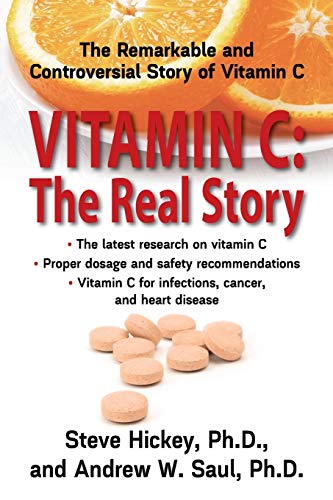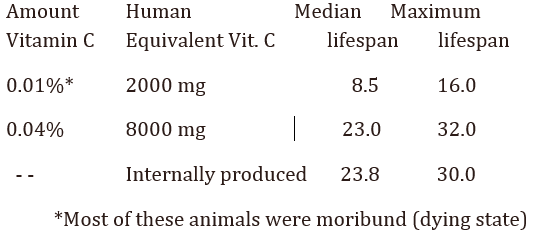Over a decade ago I wrote an article at LewRockwell.com entitled Can Humans Live Longer? The Missing Anti-Aging Hormone.
I explained the biological predicament of humans, that a gene mutation occurring long ago in human history shortened the human lifespan. Gulonolactone oxidase is among four liver enzymes most animals utilize to internally convert sugar to ascorbate (vitamin C). A mutation in the GULO gene for this enzyme also occurs in fruit bats, guinea pigs and primate monkeys and has forced these species along with humans to totally rely upon dietary sources of vitamin C to maintain health.
In the 1970s biochemist Irwin Stone explained that animals that make their own vitamin C live 8-10 times beyond their age of physical maturation. Mammals without this ability have a difficult time reaching 3-4 times. Today humans reach physical maturity around age 18 and live 70-90 years. If what is known from animals can be applied to humans, restoration of internal synthesis of vitamin C could theoretically produce humans that live hundreds of healthy years.
As early as 1984 researchers knew that supplementation of drinking water of laboratory mice with vitamin C increased the average life span of mice by 8.6% to 20.0 percent. The maximum lifespan was only increased by 2.9% compared to normal mice. But this research study overdosed the animals to deliver a pro-oxidant dose of vitamin C (1430 milligrams per kilogram-2.2 lbs. of body weight) or the human equivalent of 100,000 milligrams/day.
 Vitamin C: The Real St...
Best Price: $8.91
Buy New $12.47
(as of 10:10 UTC - Details)
Mega-dose vitamin C induces transient hydrogen peroxide (H2O2) that can selectively kill germs or cancer cells and then non-toxically turn to H2O (water). One wonders if an overdose was intentionally used to stall further research efforts.
Vitamin C: The Real St...
Best Price: $8.91
Buy New $12.47
(as of 10:10 UTC - Details)
Mega-dose vitamin C induces transient hydrogen peroxide (H2O2) that can selectively kill germs or cancer cells and then non-toxically turn to H2O (water). One wonders if an overdose was intentionally used to stall further research efforts.
Thirty-two years later researchers in Canada set out to determine how much vitamin C it would take to replicate the state of health observed in animals that normally make vitamin C compared to animals that were genetically altered (dysfunctional GULO gene) and internally produce no vitamin C.
In March of 2016 these researchers reported in the journal AGING that much more modest doses of supplemental vitamin C as delivered in drinking water profoundly restored a normal lifespan to laboratory mice genetically altered with a dysfunctional gulonolactone oxidase gene, the same biological state humans find themselves in.
Genetically altered mice (dysfunctional GULO gene)
Not only were these genetically-flawed vitamin C-supplemented animals able to live as long as normal mice that endogenously produce their own vitamin C but they also maintained a healthy state for a far longer period of time.
 Curing the Incurable: ...
Best Price: $22.60
Buy New $18.89
(as of 08:55 UTC - Details)
Curing the Incurable: ...
Best Price: $22.60
Buy New $18.89
(as of 08:55 UTC - Details)
The normal vitamin C-producing mice lived ~2/3rds of their lives free of the cursed symptoms of advancing age. The genetically-flawed mice given the human equivalent of 2000 mg/day of vitamin C (0.01% in drinking water) only lived about a quarter of their shortened lives free of age-related symptoms. But the genetically-altered mice that did not internally produce vitamin C but were given the human equivalent of 8000 mg vitamin C/day lived symptom-free about two-thirds of their lives, equal to what the normal vitamin C-producing mice achieved (see chart below).
This experiment suggests a major genetic quandary in humans can be overcome with supplemental vitamin C. Taking 2000 mg of vitamin C four times a day (8000 mg total) at equal intervals (upon waking, noontime, dinner and bedtime) is achievable.
Of course this data is only directly applicable to lab rats. Is there any evidence that increased vitamin C consumption can prolong the human life span? A report published in 1992 in the journal Epidemiology is telling. A study of 11,000 Americans over 10 years
 Ascorbate: The Science...
Best Price: $23.95
Buy New $22.86
(as of 03:10 UTC - Details)
revealed that individuals with the highest level of vitamin C intake, only about 300 milligrams (5 oranges a day), suffered 35 percent fewer deaths than those with the lowest intake, about 50 milligrams (1 orange a day). This amounts to about six added years of life to those who consume higher levels of vitamin C.
Ascorbate: The Science...
Best Price: $23.95
Buy New $22.86
(as of 03:10 UTC - Details)
revealed that individuals with the highest level of vitamin C intake, only about 300 milligrams (5 oranges a day), suffered 35 percent fewer deaths than those with the lowest intake, about 50 milligrams (1 orange a day). This amounts to about six added years of life to those who consume higher levels of vitamin C.
Since 300 mg of vitamin C is difficult to obtain from dietary sources alone, the primary group that exhibited increased lifespan was largely comprised of vitamin C supplement users.
The prospect of reinstalling the gulonolactone oxidase gene in humans has been proposed. This reinstatement would theoretically extend the human lifespan to those of the Biblical patriarchs who likely lived before the cursed gene mutation occurred. But the GULO gene would have to be inserted in vitro, that is, in women’s eggs, and the next generation of humans would naturally produce vitamin C.






